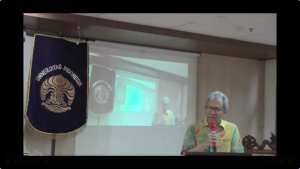Wednesday, November 1, 2023, the Faculty of Public Health (FPH) Universitas Indonesia (UI) together with the Indonesia One Health University Network (INDOHUN) held a guest lecture on the topic “Antimicrobial Resistance in Humans Impacted by Environmental Changes”. The event presented Prof. Dr. Marko Virta from the University of Helsinki, Finland, as resource person. This guest lecture was held in a mixed manner in the FPH UI Doctoral Promotion room and via the Zoom Meeting platform.

The complexity of antimicrobial resistance coincides with the need for a more comprehensive understanding of the relevant risk factors. “There is a need for multidisciplinary team efforts to study the emergence and spread of antimicrobial resistance (AMR) in various locations globally, with a focus on Indonesia,” said Prof. Dr. Mondastri K. Sudaryo, M.S., D.Sc., Dean of FPH UI, in his speech. Prof. Mondastri conveyed the importance of antibiotic use and the lack of understanding of the big picture and its impacts, especially in relation to microbial ecology and the evolution of AMR. Prof. Mondastri also emphasized the importance of vaccines, sanitation, education at all levels, as well as the wise use of antibiotics in reducing this problem.
Prof. Marko Virta, a Professor of Microbiology at the University of Helsinki, Finland, delivered material on Antimicrobial Resistance (AMR). The discussion focuses on AMR in the context of climate or environmental change. Prof. Virta emphasized the global threat posed by AMR and highlighted the importance of a one health approach in addressing this problem. He also shared his research on antibiotic resistance in various environments impacted by human activities, such as wastewater and agriculture. “Talking about AMR means talking about One Health System efforts, which are related to human health, animal health and environmental health,” said Prof. Virta.
Wastewater treatment plants are now primarily designed to remove nutrients and other harmful chemical compounds, especially micropollutants and antibiotics. He highlighted that wastewater is a mixture of bacteria including antibiotics and various bacteria which have the potential to become hotspots for antibiotic resistance. However, the study found that wastewater treatment plants effectively reduced resistance, with a relative reduction in antibiotic resistance genes and a significant reduction in bacterial numbers. Prof. Virta also mentioned that a global waste project led by Frank Astro from Denmark which used genomics to sequence all the DNA from wastewater and produce a world map had shown the prevalence of antibiotic resistance. Map analysis showing the distribution of AMR in the African and South American continents, as well as the Middle East, highlighted as a problematic continent due to a lack of data in many African countries and limited resources in low- and middle-income countries. The Asian continent is an area that is classified as having minimal impact of antibiotic resistance on the environment.

AMR can also be studied with metaxenomics, which means isolating all the DNA in a sample and sequencing it and must be done without any enrichment and/or without any amplification to study the real situation. The advantage is that you can get the sequence of all the genes to study the desired engineering. He also mentioned that we can also analyze the genetic environment of the target cell whether it is in cellular synthetic elements or not. This procedure is a kind of principle of epidemiological analysis.
Not only that, but Prof. Virta also highlighted the issue of the use of antibiotics in agriculture and its impact on the environment. “Half of all antibiotics are used on animals and the residue ends up in the environment, thus contributing to antibiotic resistance,” said Prof. Virta. He also mentioned research conducted by Christian Brand from Copenhagen, Denmark, which showed that the use of copper, zinc or tetracycline in soil can cause antibiotic resistance. This study also found that the continuous use of antibiotics in fish farms can cause the spread of antibiotic resistance genes in farm sediments and fish intestines. However, Prof. Virta highlighted that the use of antibiotics in feed did not contribute to the resistance genes found in the sediment. (DFD)

